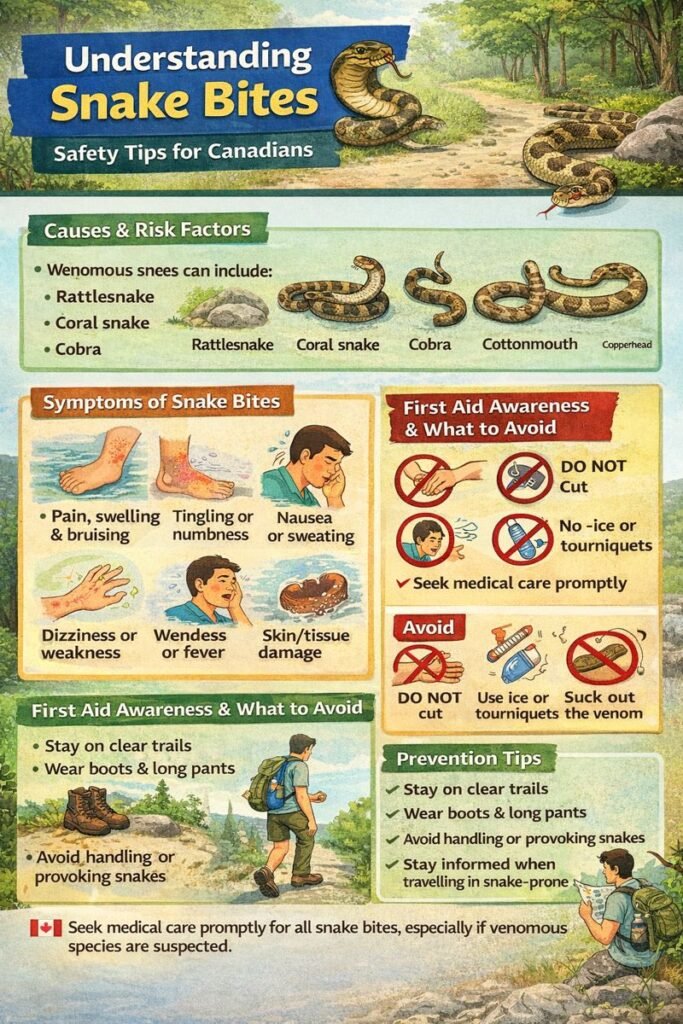Snake Bites: Awareness, First Aid Education & Travel Safety for Canadians

First Aid & Workplace Relevance
In Canada, venomous snakes are uncommon and bites are rare; however, many Canadians travel to areas where venomous snakes are more prevalent. Outdoor workers, guides, and emergency responders occasionally encounter snakes in parks and remote environments. Public awareness supports safer decision-making, reduces panic, and encourages timely medical care when needed.
Realistic Scenario
While hiking with friends, someone accidentally stepped near a rock ledge and startled a small snake. They felt a sharp sting at their ankle and noticed two small puncture marks. A friend helped them stop walking, stay calm, and seek help. Park staff arranged transport to a medical facility to confirm the species and treatment. The person recovered after medical assessment.
Causes & Risk Factors
Many snake species are harmless and avoid confrontation. A few species in various parts of the world are venomous, including:
-
Rattlesnakes
-
Coral snakes
-
Cobras
-
Cottonmouths
-
Copperheads
Snakes may bite when:
-
Accidentally stepped on or cornered
-
Encountered during yard work, trail use, or travel
-
Handled for recreational or wildlife purposes
Symptoms of Snake Bites
Symptoms vary depending on the species, the amount of venom delivered, and the person’s response.
Commonly reported symptoms include:
-
Pain or swelling at the bite site
-
Skin changes, bruising, or discoloration
-
Tingling or numbness
-
Nausea or vomiting
-
Dizziness or feeling faint
-
Sweating or fever
-
Rapid pulse
-
Blurred vision
-
Weakness or muscle coordination changes
More serious reactions may include tissue damage or breathing difficulties in some cases. Prompt medical assessment helps determine the appropriate management.
First Aid Awareness & What the Public Can Do
Public first aid training emphasizes calm, safe, and supportive actions until medical care is available. Key points include:
-
Encourage the person to remain calm, limit movement, and avoid walking if possible
-
Keep the bite area still and low relative to the heart to reduce venom movement
-
Remove rings or tight clothing in case of swelling
-
Seek medical care promptly, especially if a venomous species is suspected or symptoms progress
Antivenom and other treatments are administered by medical professionals when clinically appropriate.
Important Cautions
To avoid worsening injuries, public health education generally advises against:
-
Cutting the skin or attempting to remove venom
-
Applying ice or extremely cold packs
-
Using tourniquets or tight bands
-
Sucking venom by mouth
-
Giving substances or medications without medical direction
-
Raising the affected limb above heart level
These actions can cause additional harm and delay proper medical treatment.
Prevention & Safety Tips
People who hike, camp, or travel to areas with venomous snakes can reduce risk by:
-
Staying on clear trails and avoiding tall grass or rock crevices
-
Wearing closed-toe footwear
-
Learning about local snake species when travelling
-
Avoiding attempts to handle or provoke wildlife
-
Using a light source at night when walking outdoors
-
Seeking local guidance in parks or reserves
FAQ
Are venomous snake bites common in Canada?
No. Venomous bites are uncommon in Canada, though rattlesnakes are present in specific regions. Most Canadians encounter venomous species while travelling.
Do all snake bites require medical attention?
A medical assessment is recommended to rule out venom exposure, identify the species, and manage symptoms.
How fast do symptoms appear?
Symptoms can appear quickly or gradually depending on the species and individual factors. Medical professionals assess and monitor for progression.
Can antivenom cure snake bites?
Antivenom can help neutralize venom for certain species when used by trained professionals. Its use depends on the type of snake and clinical evaluation.
Do snakes bite only when threatened?
Generally yes. Most snakes prefer to avoid humans and strike mainly when startled or cornered.
Educational Note (end of post body)
This content supports outdoor and travel safety awareness and encourages appropriate medical care if snake bites occur.
